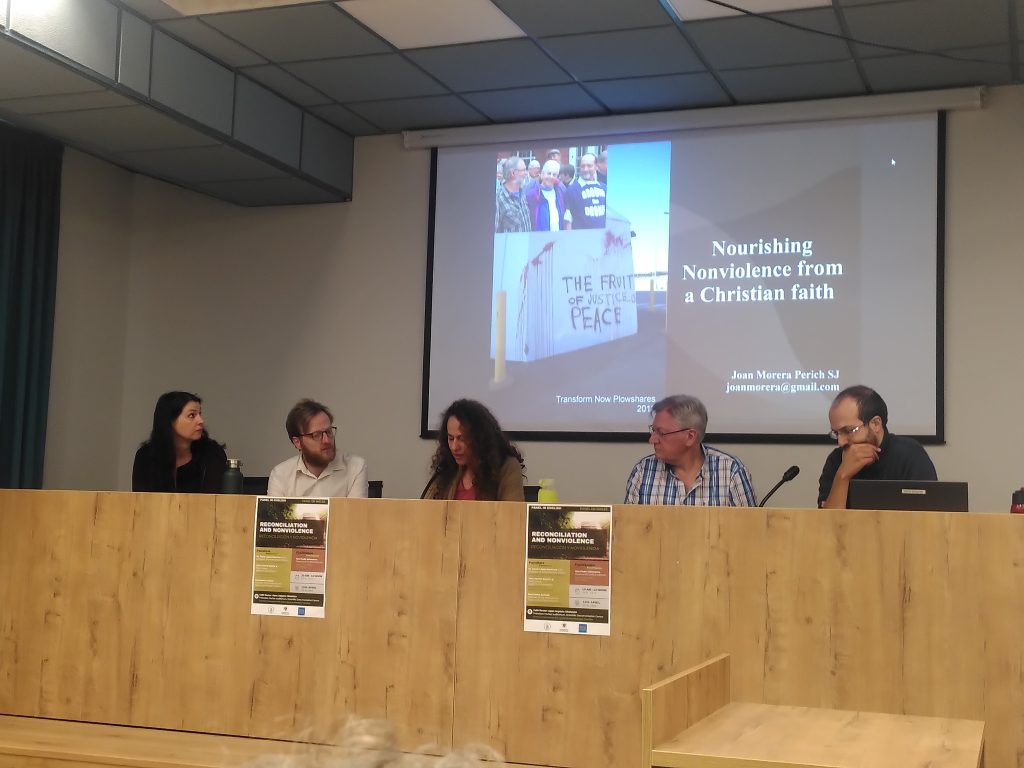Thanks to a grant from The Bill Snelson Young Ecumenists Fund, I was able to travel to the 2024 meeting of the European Branches of the International Fellowship of Reconciliation(EuFoR) which took place in Granada, Spain in April 2024.
I’m a member of the Fellowship of Reconciliation (FoR) in England and Scotland and I travelled with two other members, Annie, who is a Trustee and John, the Director. As FoR England and Scotland has a sustainable travel policy, we went to southern Spain by train, which meant overnight stops in Barcelona en route.
The conference was held at the Comendadoras de Santiago Convent in Granada, a Roman Catholic convent offering hospitality to groups and pilgrims. Those attending the conference, both in person and online, were from Germany, Austria, Spain, Sweden, Wales, France, England and Scotland and were of different church backgrounds, including Methodist, Lutheran and Roman Catholic traditions. We heard about the “Fundacion Persona y Justica” a local centre for peace, justice and ecology that aims to bring people of different religions together, which added an interfaith element to the gathering.
On our first day, we visited the Peace Institute at the University of Granada. There was a panel discussion titled “Nonviolence & Reconciliation”. One of the speakers, Joan Morera Perich, spoke about Jesus’ teachings on nonviolence and nonviolence theory, including how nonviolence can expand from a way of dealing with conflict to a way of living. After the event, we visited a church where a group was holding a drop-in to raise awareness of the conflict in Palestine. We heard from members of the group about what they have been doing locally to raise awareness and how people had been reacting to the ongoing events.

In the afternoon, we heard about the Nonviolence Defence programme in Germany. The idea behind this scheme is to enable people to defend themselves without weapons. I learned that while full demilitarisation is the eventual aim, we are not ready for that yet, as our sense of security is tied up in having weapons whether we like it or not. After that, we heard about the Global Day of Action on Military Spending. Since 2001, military spending has been going up and the environmental impact of the arms trade is slowly coming to light. My fellow delegate, Annie, has written a blogpost on this subject.
On Day 2, we had updates on the International Fellowship of Reconciliation. In the afternoon we walked, as a group, through the city to two military centres in Granada. We heard about how military spending is affecting the climate, and at another point stopped to listen to a re-imagining of Martin Luther King’s Vietnam War speech as if he was speaking today. It was a powerful moment of witness, visibly showing our opposition to the military and hearing words calling for peace and nonviolence. (See the main photo. I am second from the right, wearing sunglasses)
On the final day, I led a workshop with Annie. We called it the Activist Tree Reflection. It uses the different parts of a tree to guide the group through a reflection on being activists and our hopes for the future. It was great to be able to offer this space for reflection to the group after we’d received so much new information over the preceding few days. Read more about the workshop.
Overall the conference was a chance to meet like-minded ecumenists from across Europe and it was interesting to hear about unity working in their country. Particularly, as we were in Spain where there is very little ecumenical work.
Running the workshop was a highlight for me because it opened up conversations with others about their peace activist journey, which, for many, is intertwined with our faith identities. The workshop was very successful and we will be running it again at this year’s Greenbelt Festival in the Iona Community’s tent called The Wild Goose.
I’ve been involved in ecumenism through university chaplaincy, when I was working at Iona Abbey for the Iona Community and through being a Trustee of Inclusive Church. My experience in Granada was another affirmation of how ecumenism is the way forward, because by working together, across boundaries of nation or denomination, the branches of IFoR are achieving a lot more than they would be otherwise. I believe that the same applies to individual churches.
The Fellowship of Reconciliation and the Iona Community are both Charities and Networks in Association with CTE.
Find out more about The Bill Snelson Young Ecumenists Fund and read about the experience of other grant awardees.